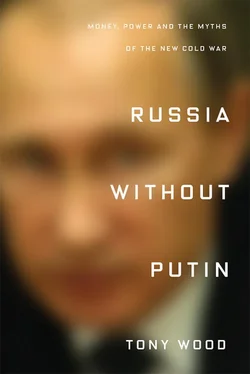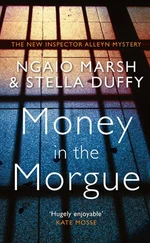This distinction between ‘insiders’ and ‘outsiders’ is especially significant because it sheds light on the murky battles over power and property that were then unfolding. Often depicted as a simple struggle between oligarch-entrepreneurs and the vestiges of the planned economy, between business and the state, these battles should more properly be understood as fluctuations in the relative influence of the two categories of tycoon. Both ‘insiders’ and ‘outsiders’ profited from the different forms of privatization – ‘red directors’ seizing the factories under their control, entrepreneurs setting up banks, ex-Komsomol members and oilmen acquiring mines and wells by decree. But there were also some crucial differences between the two groups, and these help us understand what did and did not change in Russian capitalism from the 1990s to the 2000s.
One was the broad sectoral division that emerged. ‘Insiders’ dominated large-scale industry – natural resources, energy, metallurgy, engineering – while ‘outsiders’ mostly made their initial fortunes in banking, consumer goods, the media. One group tended to own physical assets, the other financial wealth. For much of the 1990s, economic conditions favoured the ‘outsiders’: industrial production was crippled, and those with access to large reserves of cash had the edge. [2] Of course, ‘insiders’ could still make money from their industrial holdings through transfer pricing, creative accounting or asset-stripping; but it was much more difficult to turn a profit from production itself.
By the middle of the decade, ‘outsider’ oligarchs had used this advantage to extend their holdings into other sectors, grabbing assets ranging from mines to airlines, factories to TV stations. Berezovsky, for instance, came to own Aeroflot, the car giant Avtovaz, the public TV station ORT and the newspaper Nezavisimaia gazeta . Gusinsky’s holdings included Most-Bank, the television station NTV and newspapers such as Segodnia . Smolensky owned Agroprombank and the newspaper Kommersant . Mikhail Fridman and Pyotr Aven jointly dominated Alfa-Bank.
A second key difference lay in the two groups’ attitudes toward the state. These were rooted in fundamentally divergent experiences. Insiders, as their name suggests, tended to be better connected to the regional and national government apparatus, often through informal ties forged in the Soviet era. These now served as a form of political insurance, allowing them to secure state approval or assistance for their business activities. Outsiders, on the other hand, had largely profited from symptoms of the USSR’s collapse, and lacked such connections. As a result, they had to seek insurance in other ways: either through bribery or by funding their own candidates for political office. During the course of the 1990s, when ‘outsiders’ had the advantage economically, they were also more active than ‘insiders’ in pressing forward their interests politically. The penetration of state institutions by business interests was especially marked in the Duma: according to one astute analyst, in the 1990s ‘most deputies were more or less openly on the payroll of one oligarch or another.’ {18} 18 Gustafson, Wheel of Fortune , p. 294.
By the mid-1990s, it had begun to seem as if the ‘outsiders’ had gained the upper hand not only over the ‘insiders’, but also over the state itself. Perhaps the most flagrant demonstration of this came in late 1995, with the infamous ‘loans-for-shares’ deals. Strapped for cash and in desperate need of support for his re-election bid the following year, Yeltsin authorized a series of rigged auctions through which stakes in a dozen companies were offered to select oligarchs as collateral on loans totalling $1 billion. In exchange, the media outlets they owned offered full-throated backing for Yeltsin’s presidential campaign. When the auctions went ahead in November–December 1995, rival bidders were excluded, in some cases physically: local authorities in the Siberian town of Surgut ordered the airport to be closed while the oil company Surgutneftegaz sold a 40 per cent stake to its own pension fund.
The biggest winners, inevitably, were the most powerful billionaires. Vladimir Potanin, who had come up with the scheme in the first place, paid just $170 million for Norilsk Nickel, a company with revenues of $3.3 billion and profits of $1.2 billion in 1995. He and his associate Mikhail Prokhorov also picked up a majority stake in the oil company Sidanco for $130 million. Khodorkovsky acquired 78 per cent of the oil company Yukos for $300 million; within two years it would have a market capitalization of $9 billion. {19} 19 See Gustafson, Wheel of Fortune , p. 136 and Hoffman, The Oligarchs , p. 398.
Another oil company, Sibneft, went to Berezovsky for just $100 million; a few years later it had a market capitalization of $1 billion. {20} 20 Hoffman, The Oligarchs , pp. 315, 318, 319–20; Barnes, Owning Russia , pp. 112–13.
‘Loans for shares’ is often invoked as the most brazenly crooked of the Yeltsin government’s privatizations, which it probably was. But it was not, as is commonly supposed, the origin of the leading oligarchs’ wealth. Rather, it stood as public proof of these outsider tycoons’ hold on the country, and of their ability to bend the state to their will. Having acquired phenomenal wealth during the first half of the decade, they now used it to obtain political power, the better to cement their grip on their fortunes. After all, they had so far made their money between the cracks of the state; how much more could they make if they were in control of the whole thing? Sure enough, once Yeltsin was safely reinstalled in the Kremlin in the summer of 1996, the oligarchs began to arrange a further carve-up of state assets. In 1997, for example, a bitter feud erupted among them over telecoms provider Sviazinvest. That year, when American diplomat Thomas Graham asked an unnamed oligarch if it wasn’t time to start investing in production, he replied, ‘No… we still have to divide up all the property.’ Since Russia was a big country, he added, this would take some time. {21} 21 Quoted in Reddaway and Glinski, Tragedy of Russia’s Reforms , p. 494.
In January 1996, just after the loans-for-shares auctions, sociologist Olga Kryshtanovskaia was among the first to popularize a new term for Russia’s elite: she argued that the country was witnessing the emergence of a new ‘oligarchy’, since the biggest tycoons not only dominated the national economy, they were also beginning to control the political scene. {22} 22 Kryshtanovskaia, ‘Finansovaia oligarkhiia v Rossii’, Izvestiia , 10 January 1996.
Berezovsky – appointed deputy head of the National Security Council that October – famously boasted that he and the other oligarchs owned half the economy; it began to seem as if they had privatized the government too. ‘From my point of view,’ Berezovsky told one interviewer, ‘in general, power and capital are inseparable’. He added, after a pause, that ‘if something is advantageous to capital, it goes without saying that it is advantageous to the nation’. {23} 23 Hoffman, The Oligarchs , p. 360.
Wealth seemed to be dictating terms to power, in a phenomenon often referred to as state capture.
But this apparent victory for capital over the state was deceptive, in two respects. Firstly, it was not so much a triumph of private business as of a specific kind of businessman – the ‘outsider’. The outsiders’ ascendancy was based on years of success in exploiting a combination of government largesse and disarray in the state apparatus, and on the persistence of an economic depression that placed the ‘insiders’ at a disadvantage. But, secondly, despite what the outsider oligarchs and many others seemed to think at the time, neither of these conditions was permanent. What looked like ‘state capture’ was not a definitive seizure of political power by the economic elite as a whole, but a temporary surge in the influence of one of its factions. For most of the 1990s, the pendulum had swung toward the outsiders; soon, both of the preconditions for their dominance would vanish, and it would start to swing the other way.
Читать дальше












